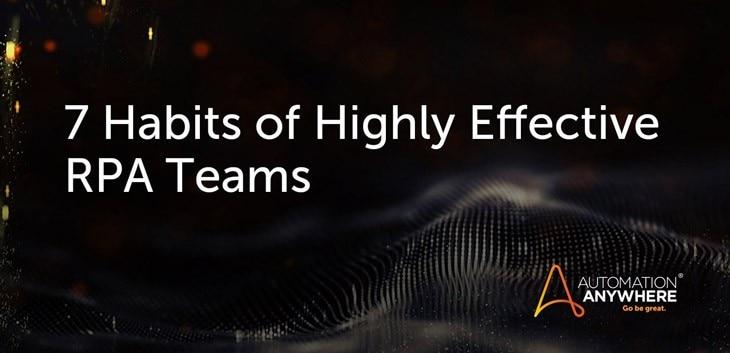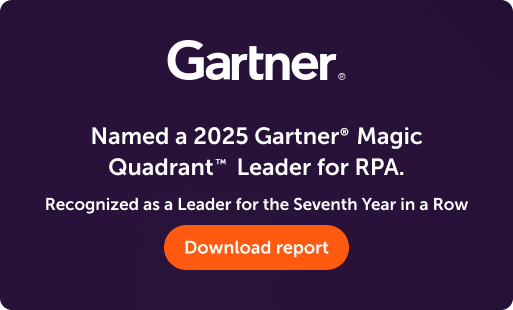- Login
- Search
- Contact Us
-
Have a question? Our team is here to help guide you on your automation journey.
-
Explore support plans designed to match your business requirements.
-
How can we help you?
-
- AI
AI Without the Hype From pilot to full deployment, our experts partner with you to ensure real, repeatable results. Get Started
- Automation Anywhere AI
-
- Solutions
Featured Agentic Solutions
Accounts Payable Invoice automation—No setup. No code. Just results. Accounts Payable
Customer Onboarding Scale KYC/AML workflows. Customer Onboarding
Customer Support Keep queues moving, even at peak load. Customer Support
Healthcare RCM Revenue cycle management that runs itself. Healthcare RCM
- Products
Platform Features
- Agentic process automation (APA)
- Robotic Process Automation (RPA)
- View all Products
-
- Resources
Get Community Edition: Start automating instantly with FREE access to full-featured automation with Cloud Community Edition.
Featured
 Named a 2025 Gartner® Magic Quadrant™ Leader for RPA.Recognized as a Leader for the Seventh Year in a Row Download report Download report
Named a 2025 Gartner® Magic Quadrant™ Leader for RPA.Recognized as a Leader for the Seventh Year in a Row Download report Download report- Become an Expert
- Developer Tools
- Get Support
- View all resources
-
- Partners
Find an Automation Anywhere Partner Explore our global network of trusted partners to support your Automation journey Find a Partner Find a Partner
- Find a Partner
- For Partners
-
Share this:
To be a digitally transformed organization and compete with digitally born companies, it’s essential to watch the advent of cutting-edge technologies and how they’re improving business operations. Robotic Process Automation (RPA) is one of the leading technologies taking the world by storm by improving business operational efficiency.
Taking a cue from Steven Covey and his book “The 7 Habits of Highly Effective People,” let’s explore seven ways your organization can be on the forefront of this technology innovation.
1. Be proactive
Educate employees on how RPA implementations will improve their overall work and help establish a bottom-up approach. Encourage them to come up with RPA use cases that can be automated in their day-to-day work.
Because they’re executing many of the tedious, manual processes, employees are best positioned to provide detailed information about them and be the best judges of where there’s room for improvement.
2. Begin with the end in mind
Envision how you want your business operations to perform at a future time frame — for example, two to three years from now. Backtrack the list of activities to be performed from now onward so that you can achieve your targeted operational efficiencies. Create a framework for each of these parameters:
- Process assessment and roadmap
- Vendor selection criteria
- Implementation methods
- Governance model
- Change management and business continuity plans
- Key performance metrics
Measure the progress for each milestone against the metrics established continually. Analyze the performance, identify the pitfalls, migrate the risks, and innovate to improve the outcome.
3. Put first things first
Identify the processes that make sense to be automated first. Don’t start with a process that’s extremely critical or complex. Selecting processes that can give you quick wins is a sure way to get buy-in from senior management and to prove the selected platform and processes can be scaled to automate more and more processes.
Create a framework for how you’ll identify these processes based on the following parameters:
- Transactions volume
- Process standardization
- Manual involvement requirements
- Expected process/system changes in the near future
4. Think win-win
Showcase how your RPA implementation will be beneficial to both the organization and employees. Try to understand the employees’ pulse. If they have any fears or concerns, address them. Prepare a charter on how employees’ work will improve with RPA and design their career paths accordingly.
Prepared employees are not only an advantage to the organization implementing RPA, but they also typically enjoy working with the latest technologies and updating their skill sets. RPA provides an opportunity for employees to focus their efforts on customer-centric and value-added initiatives and build better relationships that can bring in more business opportunities.
5. Seek first to understand, then to be understood
Try to understand customers’ pain points and identify how your solutions can help. Showcase how you’ve helped other organizations solve similar issues and detail the benefits of implementing RPA, including:
- Reduced human error
- Integration across platforms
- Improved customer experiences
Identify any fears customers have of implementing RPA in their organizations such as only reducing costs, lack of suitability for the industry, bot security, and effects on human workers.
Dig deep into customers’ specifics and bust their myths with the right guidance. Once you’ve established trust with the customer and convinced him or her of the benefits, you can chart the next steps to help them begin the RPA journey.
6. Synergize
It’s time we look beyond competition and collaboration. RPA platforms are extensible, meaning you don’t have to solve every automation challenge with the platform itself. Instead, you can explore integrations with solutions that can complement the platform’s capabilities.
Identify different ways of solving a problem and then select the best-suited solution for your use case. You may find such solutions in Bot Store, the world's largest marketplace for prebuilt intelligent automation solutions. There, you can identify different automations built by partner companies to solve the question at hand.
7. Sharpen the saw
Whether your organization is just getting started or has experience with RPA projects, it’s important to keep up with the latest concepts, technological improvements, and learnings from leading organizations that have implemented complex RPA solutions successfully.
As team members from various backgrounds start working on RPA projects and building bots, they require formal training before honing their skills. To equip different users in the RPA project team with the right skill sets, assign different RPA courses from Automation Anywhere University that match their roles.
For example, you can assign various workers to the Bot Developer, RPA Program Manager, Technical Support Specialist, and Business Analyst coursework, and learning trails. Also, look at the latest, Automation Anywhere Secure Bot Developer learning trail, which educates about building security into bots.
Encourage team members to complete the learning trails and certifications and to showcase their newly acquired badges and certificates to be on par with RPA practitioners across the globe.
They can also ask questions, answer queries, and discuss multiple solutions in forums such as A-People. Once they meet the required criteria in this forum, they can brag about their A-Lister status, providing them global visibility in the world of RPA.
Learn RPA and improve business operational efficiency.
About Arjun Meda
Arjun Meda is an RPA evangelist and part of the Bot Store developer relations team. He has more than a decade of IT expertise with a specialized focus in automation and digital transformation for global organizations.
Subscribe via Email View All Posts LinkedInAuthor's recent posts
Get to know the Agentic Process Automation System.

For Students & Developers
Start automating instantly with FREE access to full-featured automation with Cloud Community Edition.



